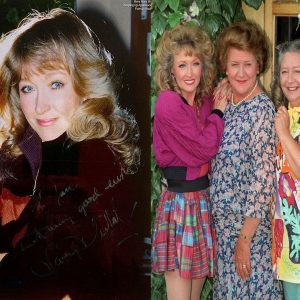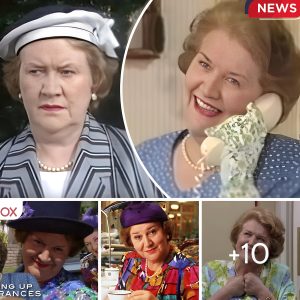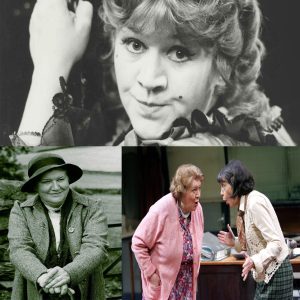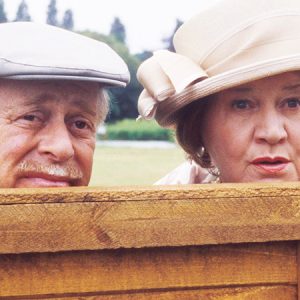“Richard Bucket: The Quiet Heart of Keeping Up Appearances – A Closer Look at TV’s Most Henpecked Hero”
In the rich pantheon of British sitcoms, few characters have inspired more collective sympathy—and laughter—than Richard Bucket, the mild-mannered, perpetually flustered husband of Hyacinth Bucket (that’s “Bouquet,” thank you very much). As the reluctant right-hand man to the most socially aspirational woman in British television history, Richard served not only as a comedic foil but as the emotional anchor of Keeping Up Appearances, the hit BBC series that has since become the broadcaster’s most successful overseas export.
But behind every dominating diva is a husband pushed to the brink—and somehow still smiling. Let’s take a deep dive into the character of Richard Bucket, the man who endured candlelit suppers, impromptu musical performances, and a marriage so intense that even military service seemed like a vacation.
The Reluctant Retiree
When we first meet Richard, he’s a stoic local government official, clinging to routine and order. But that comfortable structure is quickly shattered when he’s forced into early retirement. The moment is one of the rare instances where Keeping Up Appearances flirts with melancholy—Richard, overwhelmed by the reality of spending more time at home (and more importantly, more time with Hyacinth), descends into what can only be described as a heroic breakdown.
The news of his retirement hits like a Shakespearean plot twist. There’s genuine despair, confusion, and even tears as he walks around in a daze, confronted with the terrifying prospect of daily life under the absolute reign of Hyacinth. It’s less about losing a job and more about losing his last bastion of sanity.
The Henpecked Husband We Couldn’t Help But Love
Richard is the very definition of the “Henpecked Husband” trope, but what makes him so compelling is his quiet dignity. While Hyacinth dreams of garden parties with the Major and boasting about her sister Violet’s Mercedes, Richard is just trying to survive the day without breaking any heirloom china—or his spirit.
Though constantly pulled into Hyacinth’s elaborate schemes—be it transporting hand-painted periwinkles in the backseat of their Rover or pretending to be part of the aristocracy for a visiting vicar—Richard rarely resists outright. His stoicism becomes its own form of resistance. He nods, he sighs, he obeys—but every so often, a razor-sharp one-liner or sarcastic glance betrays his true feelings. He’s the ultimate deadpan snarker, offering the audience a lifeline of sanity in Hyacinth’s maddening world.
And yet, when push comes to shove, he shows flashes of steel. When Hyacinth pushes too far—interrupting strangers, risking public humiliation, or embarking on yet another misguided plan to elevate her social standing—Richard occasionally reaches his breaking point. And when he does, the room goes silent. Even Hyacinth, formidable as she is, listens when Richard raises his voice.
More Than Just a Punchline
Though Keeping Up Appearances is a farce, Richard’s character is steeped in realism. The audience doesn’t just laugh at him—they empathize with him. His relationship with his son Sheridan, who only seems to call to ask for money, reflects the kind of real-world parental exasperation many can relate to. Richard’s quiet discomfort with his son’s ambiguous personal life is played with nuance—not judgmentally, but with the confusion of a man from another generation.
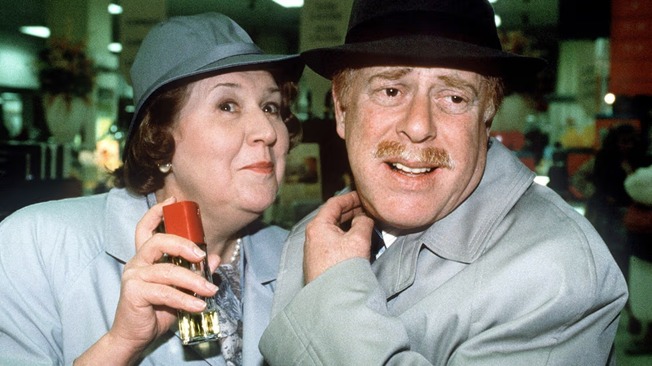
And while the marriage between Hyacinth and Richard often resembles a dictatorship more than a partnership, there’s no denying the undercurrent of genuine love. They bicker, they battle, and Hyacinth constantly drags him into chaos—but at the end of the day, they sit down to dinner, and there’s an undeniable affection in the silence. Even Onslow, Hyacinth’s slobbish brother-in-law, calls him “Dicky”—a nickname brimming with ironic affection for the man who, against all odds, sticks by her side.
As Richard himself once admitted in the show, their marriage used to be sweet—sickeningly sweet, even—before Hyacinth became consumed by her social delusions. His staying power is a testament not just to love, but to a certain British endurance: polite, patient, and perpetually proper.
The Man Behind Richard: Clive Swift’s Quiet Brilliance
Richard Bucket was brought to life by the late Clive Swift, a classically trained Shakespearean actor who gave the character a depth that far surpassed sitcom expectations. Swift’s portrayal never descended into caricature. Instead, he played Richard with restraint, wisdom, and impeccable comic timing.
Swift’s background in the theatre and his rich baritone lent credibility to the role, grounding the show’s outlandish scenarios with a touch of gravitas. Off-screen, Swift was also a talented musician and toured the UK with a one-man musical revue, Richard Bucket Overflows.
Following the conclusion of Keeping Up Appearances in 1995, Swift continued to appear on stage and screen, including a memorable guest role in Doctor Who alongside Kylie Minogue in the 2007 Christmas special. His final television appearance was in Midsomer Murders in 2017. He passed away in 2019 at the age of 82, survived by three children from his marriage to novelist Margaret Drabble.
A Comic Everyman for the Ages
Richard Bucket is one of those rare sitcom characters who lives in the cultural memory not because he dominated the screen, but because he anchored it. In a world of chaos, class obsession, and perfectly polished teacups, Richard was the man trying to hold it all together with little more than a sigh and a skeptical glance.
He was the reluctant chauffeur, the voice of reason, the straight man to Hyacinth’s delusional grandeur. And through it all—through picnic disasters, anniversary forgettings, and home security codes gone awry—he remained loyal, grounded, and quietly hilarious.
Richard Bucket may never have hosted a candlelit supper or impressed the Major, but he earned something far more enduring: the affection of millions. In a world where everyone’s keeping up appearances, he reminded us of the value of keeping our heads—and hearts—together.
And maybe, just maybe, there’s a Richard in all of us.
